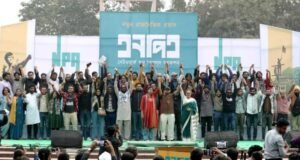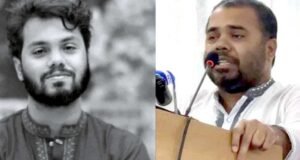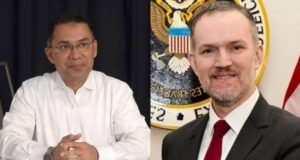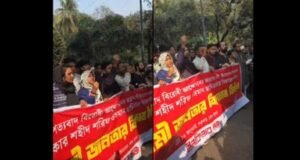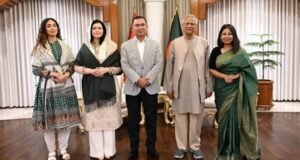
Chief Adviser Professor Muhammad Yunus on Monday reaffirmed the interim government’s unwavering commitment to safeguarding religious freedom for all citizens, regardless of faith or background.
He made the remarks during a high-level meeting with Stephen Schneck, Chair of the United States Commission on International Religious Freedom (USCIRF), at the State Guest House Jamuna in the capital.
The hour-long discussion spanned a range of pressing national and regional issues, including the state of religious freedom in Bangladesh, the July 2024 uprising, constitutional reform efforts, and the protracted Rohingya refugee crisis.
Prof Yunus stressed that religion remains deeply woven into the social fabric of Bangladesh and that the interim government is fully dedicated to promoting interfaith harmony across its 171 million-strong population.
Addressing concerns about violence against minorities, the Chief Adviser called for greater international engagement, inviting global media outlets to visit Bangladesh to verify the ground realities.
“Journalists from anywhere in the world are welcome. Many have already visited since the July events,” he said.
He also raised alarm over deliberate disinformation campaigns that have sought to misrepresent the uprising as a movement driven by religious extremism, especially in regional media narratives.
“Efforts are ongoing to rebuild trust among communities. However, violence across South Asia and the genocide in Palestine have undeniably strained domestic intercommunal relations,” he added.
Schneck expressed interest in the country’s post-uprising reform trajectory, particularly the draft constitutional amendments under review.
Prof Yunus assured him that any changes to the constitution would preserve and reinforce religious freedoms and protect the rights of minority communities.
“The Consensus Commission is actively consulting with political parties. Equal rights for minorities and the Muslim majority remain central to the proposed reforms,” he affirmed.
On the Rohingya refugee situation, Prof Yunus urged the USCIRF to amplify the call for justice and humanitarian support, highlighting the urgent need for a sustainable resolution.
He confirmed that, following his appeal, the United Nations will convene a special session on the Rohingya crisis in September.
“We’re running out of time. A frustrated and angry youth population is emerging in the camps. They deserve hope, and we must act fast,” he said.
The meeting concluded with a shared understanding of the importance of upholding religious freedom and a commitment to future collaboration between the interim administration and global rights institutions.
 Weekly Bangla Mirror | Bangla Mirror, Bangladeshi news in UK, bangla mirror news
Weekly Bangla Mirror | Bangla Mirror, Bangladeshi news in UK, bangla mirror news


